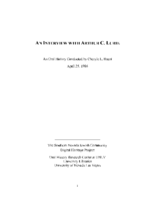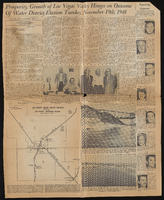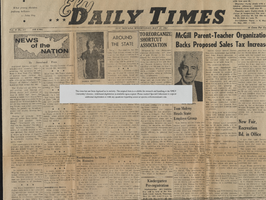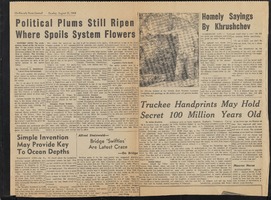Search the Special Collections and Archives Portal
Search Results

University of Nevada System Board of Regents Law School Feasibility Study
Date
Archival Collection
Description
Folder contains a Law School Feasibility Study for the Board of Regents of the University of Nevada System conducted by management consultants Cresap, McCormick and Paget Inc. From the University of Nevada, Las Vegas William S. Boyd School of Law Records (UA-00048).
Text

Rocio Rodríguez-Martinez oral history interview: transcript
Date
Archival Collection
Description
Oral history interview with Rocio Rodríguez-Martinez conducted by Elsa Lopez and Monserrath Hernández on June 21, 2019 for the Latinx Voices of Southern Nevada Oral History Project. Rocio shares her personal history growing up in Bogotá, Colombia and how she immigrated to the United States. She talks about motherhood, her Latina identity, and her experiences raising her daughter in Los Angeles and Las Vegas with her husband. Rocio also discusses her employment history and how she was able to achieve her professional goals of becoming a Spanish and English teacher for the Clark County School District (CCSD)'s Family and Community Engagement Services (FACES) program. Her interview is conducted in Spanish. Subjects discussed include: Bogotá, Colombia; El Salvador; Family and Community Engagement Services (FACES).
Text

Transcript of interview with Arthur "Art" Lurie by Cheryle Bacot, April 25, 1986
Date
Archival Collection
Description
Interview with Arthur "Art" Lurie by Cheryle Bacot on April 25, 1986. Lurie talks about his family and upbringing with Kenny Washington, who was the first African American to sign with the National Football League. Lurie discusses knowing everybody in Las Vegas in the 1950s, being in the service/retail sector and watching the city grow. He operated several businesses including grocery stores and the liquor department at Wonder World. He talks about his love of boxing, serving on the boxing commission, and advantages of living in southern Nevada.
Arthur C. Lurie lived in Las Vegas for 33 years at the time of this 1986 oral history. He and his wife Eleanor had relocated from Los Angeles area to help run his brother-in-law's food market. Over the years his career would include the grocery, bar (Art's Place) and restaurant businesses; including being co-owner of the liquor store at Wonder World. He shares memories of adjusting to the more laid back culture of small town Las Vegas and how he feels like a native after watching the city grow over the past decades. Art was a founding member of Temple Beth Sholom, where he served as an early vice-president. Being in the non-gaming sector provided gave him the opportunity to work with youth programs and he started the Golden Gloves gym in Las Vegas. He judged over 40 title fights and had a long career on the Nevada Boxing Commission. Arthur Lurie past away in 2014 at the age of 96.
Text

Transcript of interview with Bess Rosenberg by Jerry Masini, November 12, 1975
Date
Archival Collection
Description
Interview with Bess Rosenberg by Jerry Masini on November 12, 1975. In this interview, Rosenberg describes coming to Las Vegas in 1942, and the desert landscape. She gives an in-depth recollection of the first atomic test, and talks about different weather and the seasons in Las Vegas. Rosenberg describes several clubs and hotels around downtown and the recreation at Lake Mead and Mount Charleston.
Text

Transcript of interview with Charles Salton by George Green, April 23, 1976
Date
Archival Collection
Description
Interview with Charles Salton by George Green on April 23, 1976. Salton discusses arriving in Las Vegas in 1929, after his family had moved from New Jersey to Huntington Beach, California. His father sold real estate, and expected a boom after the authorization for the construction of Hoover Dam. His father was involved in bootlegging and then owned Al's Bar, a drinking and gambling establishment, on the alley at South First Street. Salton describes the area around Fremont Street and Las Vegas Boulevard with businesses and grocery stores, the grammar school and high school, and the hospital. Salton talks about his social activities, including involvement in the Jewish Community Center (Temple Beth Sholom), and several of the bars, clubs and casinos in the area. He briefly discusses the mob influence in the casinos versus corporate ownership and then speaks about the education system in Clark County.
Text

Transcript of interview with Alice Cowles Brown by Eric M. Cheese, March 31, 1981
Date
Archival Collection
Description
Text




